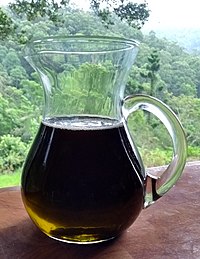
Photo from wikipedia
The aged pavement material from a defunct pavement – commonly known as reclaimed asphalt pavement (RAP) – contains stiffened binder caused by loss of volatile materials and oxidation. Therefore, addition… Click to show full abstract
The aged pavement material from a defunct pavement – commonly known as reclaimed asphalt pavement (RAP) – contains stiffened binder caused by loss of volatile materials and oxidation. Therefore, addition of a high amount of the RAP to asphalt mix, in case of pavement recycling, may make it prone to fatigue failure. Due to this reason, the addition of RAP to asphalt mixture in substantial amount has been a challenge so far. “Rejuvenators” are generally used to restore the properties of the aged binders in the recycled mixes. The present study deals with the assessment of two non-edible oils, that is, pongamia oil and composite castor oil (a composite rejuvenator having castor oil and coke-oven gas condensate) as asphalt rejuvenators to achieve 100% RAP recycling. The study mainly comprises rheological characterisation studies such as rutting behaviour, fatigue behaviour, dynamic mechanical analysis and creep-recovery studies of the rejuvenated binder specimens. Chemical investigations using infrared spectroscopy also affirmed use of these oils in effectively restoring the properties of aged binders. In addition, for assessment of the long-term performance in terms of thermostability of the rejuvenated binders, a thermal analysis was carried out using a simultaneous thermal analyser, which confirmed the adequate thermal stability of the rejuvenated binders. From the investigations taken up under this study, it was concluded that 5% oil (for both pongamia and composite castor oil) rejuvenated aged binder could show desirable rutting and fatigue behaviours and sometimes even better than the virgin binder. However, its confirmation can be laid only after suitable mix performance studies.
Journal Title: Road Materials and Pavement Design
Year Published: 2017
Link to full text (if available)
Share on Social Media: Sign Up to like & get
recommendations!